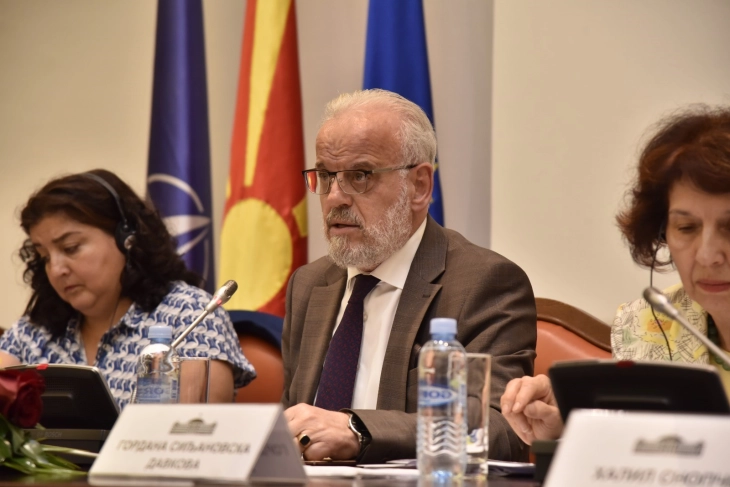Xhaferi: Parliaments play key role in recognizing human rights on a national level
- Parliaments play a key role in recognizing human rights on a national level. Through their legislative, supervisory and budgetary powers, they should ensure the promotion and protection of human rights for all. Through their control over the implementation of government policies, parliaments ensure compliance with international obligations, said Parliament Speaker Talat Xhaferi at Monday's event 'Contribution of parliaments to the work of the Human Rights Council and its universal periodic review' organized by the Parliament and United Nations in North Macedonia.
- Post By Ivan Kolekevski
- 13:52, 12 June, 2023

Skopje, 12 June 2023 (MIA) - Parliaments play a key role in recognizing human rights on a national level. Through their legislative, supervisory and budgetary powers, they should ensure the promotion and protection of human rights for all. Through their control over the implementation of government policies, parliaments ensure compliance with international obligations, said Parliament Speaker Talat Xhaferi at Monday's event 'Contribution of parliaments to the work of the Human Rights Council and its universal periodic review' organized by the Parliament and United Nations in North Macedonia.
The role of parliaments, said Speaker Xhaferi, is also essential for the incorporation of the recommendations arising from the international mechanism for human rights into national legislation, including the Universal Periodic Review (UPR) which is one of the more important mechanism of the UN Human Rights Council for a review of the fulfillment of obligations in the human rights field in every UN member state.
"Parliaments are natural partners to the UN Human Rights Council, and this relationship is recognized in the Council's resolutions on parliament's roles. They can actively get involved in every phase of UPR's process. Parliaments and MPs can contribute to the preparation of the national report and encourage the Government to implement a broad consultation process," said the Speaker.

During the presentation of the national report before the Human Rights Council, MPs from respective committees participated in the Council session as part of the state delegation.
"After receiving the report and recommendations, and the interactive dialogue with the Human Rights Council, the parliaments are the ones that should implement the necessary legislative and budgetary adjustments. Finally, parliaments, and especially parliamentary human rights organizations, can monitor and control the implementation of the recommendations given by UPR," Xhaferi added.
The Speaker noted that North Macedonia has implemented three cycles from the UPR, in 2009, 2013, and 2019. Sadly, the Parliament so far has neither been included in the preparation and presentation of the national reviews, nor in the monitoring of the outcome and voluntarily undertaken responsibility to promote and protect human rights.
"In accordance with the fourth UPR cycle, North Macedonia is supposed to present its national review by February 2024, and the interactive dialogue with the Human Rights Council will be held in April or May 2024 in Geneva. This event represents the first step in the Parliament's involvement in the process, which is to be objective, transparent, all-encompassing and inclusive, with the involvement of as many institutions and representatives from the civil sector as possible. I believe that this won't just be a first step, but that we will be able to regularly contribute to this relationship in the future," stressed Xhaferi in his address.
United Nations Resident Coordinator in North Macedonia, Rossana Dudziak, Coordinator in the UPP Department in the Office of United Nations High Commissioner for Human Rights, Sepideh Mohadjer, Standing Inquiry Committee for Protection of Civil Freedoms and Rights chair, Halil Snopche, and Parliamentary Committee for Equal Opportunities for Men and Women chair, Gordana Siljanovska-Davkova, also addressed the event. ssh/ik/
Photo: Parliament of North Macedonia







